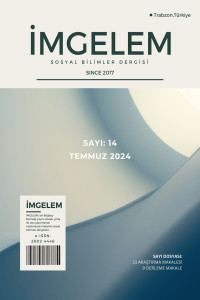Abstract
Women experience disadvantageous situations in various areas of social life. It is seen that women assume high responsibilities in the domestic sphere and childcare, especially in terms of the unequal distribution of roles and responsibilities based on gender. At this point, it is thought that women who have children with special needs face with more difficulties. Based on this, the aim of the study is to determine the difficulties experienced by women with children with special needs due to the gender roles imposed on them at home and in the public sphere. Within the scope of the study designed with a qualitative research, in-depth interviews were conducted with 28 women who have children with special needs. In the current study, it was determined that women did not receive support from their husbands in domestic work. Regarding childcare, women think that the responsibility should be equally shared. It has been also determined that women who receive help and support during the process establish healthier relationships, and have a stronger stance against situations such as helplessness and burnout. It has been observed that especially male spouses are in a more passive position in spending time with their children because of working outside, and women spend more time with children at home. As a result of the study, it is revealed that gender roles impose more responsibilities on women in this special process and that individuals should be made aware of the egalitarian sharing of social life. This is crucial for both child health and development, and the healthy physiological and psychological state of women.
Keywords
Ethical Statement
The ethics committee approval decision of the study was taken with the decision of Bursa Technical University Science, Engineering and Social Sciences Research Ethics Committee numbered E-69707128-050.04-147672 and dated 25.03.2024.
References
- Aile ve Sosyal Hizmetler Bakanlığı. (2022). Engelli ve Yaşlı İstatistik Bülteni. https://www.aile.gov.tr/media/98625/eyhgm_istatistik_bulteni_ocak_2022.pdf
- Akgün, R., Gökçearslan Çiftçi, E. G. (2010). Engelli Çocuğa Sahip Ailelerde Güçlendirme Yaklaşımı ve Sosyal Destek Sistemi, Ufkun Ötesi Bilim Dergisi, (1), 23-36.
- Altıparmak, B. (2018). Toplumsal Cinsiyet Üzerine Sosyolojik Bir Araştırma: Kaynakları ve Mücadele Alanlarına Yönelik Öneriler, Turkish Studies, 13(18), 179-194.
- Altuğ Özsoy, S., Özkahraman, Ş. ve Çallı, F. (2006). Zihinsel Engelli Çocuk Sahibi Ailelerin Yaşadıkları Güçlüklerin İncelenmesi, Aile ve Toplum, 8(3), 69-77.
- Bardakçı, Ş., Oğlak, S. (2022). Toplumsal Cinsiyet Eşitsizliği Endeksi ve Türkiye, Toplumsal Politika Dergisi, 3(1), 71-99. Başerer Berber, Z. (2021). Eğitimde Toplumsal Cinsiyet Eşitsizliğini Giderme Yolları, Uluslararası Türkçe Edebiyat Kültür Eğitim Dergisi, 10(3), 1215-1223. Bingöl, O. (2014). Toplumsal Cinsiyet Olgusu ve Türkiye’de Kadınlık, KMÜ Sosyal ve Ekonomik Araştırmalar Dergisi, 16(1), 108-114.
- Buluş, S., Ersoy, A. F. (2019). Engelli Çocuğu Olan Annelerde Tükenmişlik: Nitel Bir Çalışma, Türkiye Sosyal Araştırmalar Dergisi, 24(3), 764-781.
- Bursa Valiliği İl Planlama ve Koordinasyon Müdürlüğü. (2023). Bursa 2023 Yılı Ekonomik ve Sosyal Göstergesi. http://www.bursa.gov.tr/ekonomik-ve-sosyal-gostergeler
- Canarslan, H., Ahmetoğlu, E. (2015). Engelli Çocuğa Sahip Ailelerin Yaşam Kalitelerin İncelenmesi, Trakya Üniversitesi Sosyal Bilimler Dergisi, 17(1), 13-31.
- Coşkun, Y., Akkaş, G. (2009). Engelli Çocuğu Olan Annelerin Sürekli Kaygı Düzeyleri ile Sosyal Destek Algıları Arasındaki İlişki, Ahi Evran Üniversitesi Kırşehir Eğitim Fakültesi Dergisi, 10(1), 213-227.
- Çitil, M., Doğan, İ. (2019). Engelli Çocuğu Olan Ailelerin Yapısı ve Toplumsal İlişkilerin Belirlenmesi, Sosyal Politika Çalışmaları Dergisi, 43, 61-108.
Abstract
Kadınlar için sosyal yaşamın çeşitli alanlarında dezavantajlılık durumları yaşanmaktadır. Özellikle cinsiyet temelli olarak rol ve sorumlulukların eşitsiz dağılımı noktasında kadınların ev içi alanda ve çocuk bakımında yüksek sorumluluk üstlendikleri görülmektedir. Bu noktada özellikle özel gereksinimli çocuğa sahip kadınların daha fazla zorlandıkları düşünülmektedir. Buradan hareketle yapılan çalışmanın amacı özel gereksinimli çocuğa sahip kadınların ev içinde ve kamusal alanda onlara yüklenen cinsiyet rolleri nedeniyle yaşadıkları zorlukları saptamaktır. Nitel araştırma deseni ile kurgulanan çalışma kapsamında özel gereksinimli çocuğa sahip olan 28 kadın ile derinlemesine mülakat yapılmıştır. Çalışma kapsamında kadınların ev içi işlerde eşlerinden destek görmediği saptanmıştır. Çocuk bakımı konusunda ise kadınlar sorumluluğun eşit bir şekilde paylaşılması gerektiğini düşünmektedirler. Ayrıca süreç içinde yardım ve destek alan kadınların daha sağlıklı ilişkiler kurduğu, çaresizlik ve tükenmişlik gibi durumlarla karşı daha güçlü bir duruş sahibi oldukları saptanmıştır. Özellikle erkek eşlerin dışarıda çalıştıkları için çocuklarla zaman geçirme konusunda daha pasif bir konumda oldukları ve kadınların çocuklarla daha çok ve ev içinde zaman geçirdikleri görülmüştür. Yapılan çalışma sonucunda toplumsal cinsiyet rollerinin kadınlara bu özel süreçte daha fazla sorumluluk yüklediği ve sosyal yaşamın eşitlikçi paylaşımı konusunda bireylerin bilinçlendirilmesi gerektiği ortaya koyulmaktadır. Bu durum hem çocuk sağlığı ve gelişimi hem de kadınların sağlıklı fizyolojik ve psikolojik durumu için oldukça önemlidir.
Ethical Statement
Çalışmanın etik kurul uygunluk kararı Bursa Teknik Üniversitesi Fen, Mühendislik ve Sosyal Bilimleri Araştırmaları Etik Kurulu’nun E-69707128-050.04-147672 sayılı ve 25.03.2024 tarihli kararı ile alınmıştır.
References
- Aile ve Sosyal Hizmetler Bakanlığı. (2022). Engelli ve Yaşlı İstatistik Bülteni. https://www.aile.gov.tr/media/98625/eyhgm_istatistik_bulteni_ocak_2022.pdf
- Akgün, R., Gökçearslan Çiftçi, E. G. (2010). Engelli Çocuğa Sahip Ailelerde Güçlendirme Yaklaşımı ve Sosyal Destek Sistemi, Ufkun Ötesi Bilim Dergisi, (1), 23-36.
- Altıparmak, B. (2018). Toplumsal Cinsiyet Üzerine Sosyolojik Bir Araştırma: Kaynakları ve Mücadele Alanlarına Yönelik Öneriler, Turkish Studies, 13(18), 179-194.
- Altuğ Özsoy, S., Özkahraman, Ş. ve Çallı, F. (2006). Zihinsel Engelli Çocuk Sahibi Ailelerin Yaşadıkları Güçlüklerin İncelenmesi, Aile ve Toplum, 8(3), 69-77.
- Bardakçı, Ş., Oğlak, S. (2022). Toplumsal Cinsiyet Eşitsizliği Endeksi ve Türkiye, Toplumsal Politika Dergisi, 3(1), 71-99. Başerer Berber, Z. (2021). Eğitimde Toplumsal Cinsiyet Eşitsizliğini Giderme Yolları, Uluslararası Türkçe Edebiyat Kültür Eğitim Dergisi, 10(3), 1215-1223. Bingöl, O. (2014). Toplumsal Cinsiyet Olgusu ve Türkiye’de Kadınlık, KMÜ Sosyal ve Ekonomik Araştırmalar Dergisi, 16(1), 108-114.
- Buluş, S., Ersoy, A. F. (2019). Engelli Çocuğu Olan Annelerde Tükenmişlik: Nitel Bir Çalışma, Türkiye Sosyal Araştırmalar Dergisi, 24(3), 764-781.
- Bursa Valiliği İl Planlama ve Koordinasyon Müdürlüğü. (2023). Bursa 2023 Yılı Ekonomik ve Sosyal Göstergesi. http://www.bursa.gov.tr/ekonomik-ve-sosyal-gostergeler
- Canarslan, H., Ahmetoğlu, E. (2015). Engelli Çocuğa Sahip Ailelerin Yaşam Kalitelerin İncelenmesi, Trakya Üniversitesi Sosyal Bilimler Dergisi, 17(1), 13-31.
- Coşkun, Y., Akkaş, G. (2009). Engelli Çocuğu Olan Annelerin Sürekli Kaygı Düzeyleri ile Sosyal Destek Algıları Arasındaki İlişki, Ahi Evran Üniversitesi Kırşehir Eğitim Fakültesi Dergisi, 10(1), 213-227.
- Çitil, M., Doğan, İ. (2019). Engelli Çocuğu Olan Ailelerin Yapısı ve Toplumsal İlişkilerin Belirlenmesi, Sosyal Politika Çalışmaları Dergisi, 43, 61-108.
Details
| Primary Language | Turkish |
|---|---|
| Subjects | Women's Studies |
| Journal Section | Articles |
| Authors | |
| Publication Date | July 17, 2024 |
| Submission Date | May 23, 2024 |
| Acceptance Date | July 3, 2024 |
| Published in Issue | Year 2024 Issue: 14 |

This work licensed under a Creative Commons Attribution-NonCommercial 4.0 International License.
Please click here to contact the publisher.


